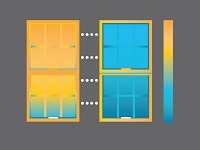
SHIELDing Windows to Save Energy with ARPA-E Program Director Eric Schiff
In one sentence, can you tell us what the SHIELD program is?
SHIELD is a portfolio of research projects seeking to solve the massive problem of inefficient and uncomfortable single-pane windows.
Why is ARPA-E interested in better windows? What’s the big deal?
Most modern windows incorporate double pane units that have two planes of glass separated by about half an inch. But every year, American building owners and renters pay utility bills that include about $20 billion for the heat that flows out of old school, single-pane windows. This is an average of about $60 per person. Of course, the actual owners and renters of older buildings end up paying much more than that—hundreds or thousands of extra dollars per year because of the single panes.
The savings created by any new technology need to be enough to pay off the cost of retrofitting in a few years. Replacing single-pane windows with modern double-panes is much more costly, and it’s hard to make a financial argument for full replacement.
When you first started investigating this area, what did you find? Was there an existing community?
The history of windows is quite interesting. Single panes were a common choice until the “oil shock” of 1973, when war in the Middle East led to an oil embargo against the United States. Before that, double panes were something of a luxury. They were not typically chosen just to save heating fuel, but rather because they were much more comfortable in cold weather and didn’t have condensation buildup. One double-pane brand name, Thermopane®, was synonymous with luxury for a generation.
I think that “low-e” (low emissivity) window films that reflect some heat energy back into a building are the best way to easily improve single pane efficiency today. However, they haven’t been adopted widely. With SHIELD technologies, we want to substantially improve the value from single pane retrofitting to building owners and occupants. Cost and energy efficiency are important, but that’s not all: Appearance, comfort and health of occupants, and soundproofing are also big factors. These qualities all play a role in the projects of SHIELD.
Now that SHIELD has had a year to get going, what kind of progress are you seeing?
I’ve been delighted with the results from several projects. A glass pane itself is a very poor insulator. So most of the SHIELD projects are working on new types of thermal insulation that lets light pass unhindered. This has been something of an impossible dream for decades but it now looks like several of our teams are going to figure it out. I think the time was right for SHIELD—we can now inexpensively engineer materials at a scale too small to be seen in an optical microscope. For windows, these specially engineered materials will be used to for thermal insulation of the glass, and they may improve soundproofing as well.
What’s the most interesting place a project visit has taken you?
SHIELD participants have been given the opportunity to tour two fascinating manufacturing facilities. A company called Madico makes window films at a plant in Woburn, Massachusetts. Another, Aspen Aerogels, makes ultra-thin insulation at a plant in East Providence, Rhode Island. It is very exciting to see laboratory breakthroughs translated into large scale manufacturing operations.

Agent of SHIELD Dr. Eric Schiff with his single-pane office window.
Your time at ARPA-E is coming to a close. What experience sticks out as the most memorable?
Scientists like me come to ARPA-E because of the opportunity to initiate enough research to have a real impact on energy and life in the United States. It’s also been a great pleasure to interact daily with exceptionally dedicated and talented people - both ARPA-E’s staff and the many other people who work with the agency.
What’s next? Does it involve windows?
I’m looking for opportunities to use what I’ve learned at ARPA-E. I want to advance the same goals from my very different position on the faculty at Syracuse University. One research possibility is work with the Syracuse Center of Excellence for Environmental and Energy Systems—which could involve windows. My teaching will also be affected by my ARPA-E experience, especially regarding the process of translating fundamental research into products and systems that affect everyday life.
Stay in touch with ARPA-E by subscribing to our newsletter.
